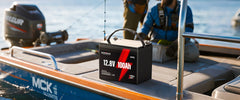
How to Choose a Kayak Trolling Motor Battery: A Practical Guide
, 8 Tiempo mínimo de lectura


, 8 Tiempo mínimo de lectura
Choosing the right battery isn’t just about getting your kayak moving — it’s the difference between a smooth, all-day fishing adventure and a frustrating trip cut short. In this guide, we’ll break down exactly what you need to know — battery types, capacity, voltage, and safety — so you can fish longer, paddle farther, and power up with confidence.
The battery powers your trolling motor, affecting:
✔ Runtime – How long can you stay on the water
✔ Performance – Speed and thrust consistency
✔ Portability – Ease of transport and installation
✔ Safety – Protection against overheating or short circuits
Too heavy – Makes the kayak unstable and hard to carry
Insufficient capacity – Cuts fishing trips short
Wrong voltage – Can damage the motor or underperform
Poor compatibility – May not fit in the battery compartment
Pro Tip: Always start with your motor specs and intended usage when choosing a battery.
There are two main types of deep-cycle batteries for kayak trolling motors:
|
Feature |
Lead-Acid (AGM/Flooded) |
LiFePO₄ (Lithium Iron Phosphate) |
|
Weight |
60–80 lbs |
25–30 lbs |
|
Lifespan |
300–500 cycles |
3000–5000+ cycles |
|
Maintenance |
Requires charging & water refills |
Maintenance-free |
|
Charge Time |
6–10 hours |
2–4 hours |
|
Voltage Stability |
Drops quickly under load |
Stable output until fully drained |
|
Upfront Cost |
Lower |
Higher (but lower lifetime cost) |
Much easier to carry and install (critical for kayak anglers)
Delivers more usable power per charge
Includes built-in BMS (Battery Management System) for protection
Supports series and parallel setups for 24V or 36V systems
Holds voltage steady for consistent motor performance
Perfect for serious anglers, long-range paddling, or anyone seeking long-term savings.
|
Motor Thrust |
Recommended Battery Voltage |
|
30–55 lbs |
12V |
|
70+ lbs or heavy load |
24V or 36V |
Use a native 24V or 36V battery
Series-connect 2 or 3× 12V LiFePO₄ batteries
(Make sure the battery supports series configuration — check the specs)
Capacity (Ah) = Runtime
Basic formula:
Runtime (hours) = Battery Capacity (Ah) ÷ Motor Current Draw (A)
Example:
A 100Ah battery with a 20A motor ≈ 5 hours runtime
|
Usage Scenario |
Recommended Battery |
Estimated Runtime |
|
Short trips/backup |
1x 50Ah LiFePO₄ |
~2.5–3 hours |
|
Full-day fishing |
1x 100Ah LiFePO₄ |
~5–6 hours |
|
Extended runtime / heavy load |
2x 100Ah LiFePO₄ in parallel |
~10–12 hours |
|
High-thrust motor (24V) |
2x 12V 100Ah in series |
~5–6 hours |
Never assume your runtime—calculate it based on motor specs and actual draw.
Most kayak battery compartments are designed for Group 24 or Group 27 sizes.
Always measure your battery space before purchase.
Lead-acid batteries (60–80 lbs) are tough to move and may affect kayak balance.
Sunrich Energy 12.8V 100Ah LiFePO₄ weighs ~25 lbs — perfect for solo loading and better tracking speed.
Lighter battery = faster top speed, better paddling efficiency, and easier transportation
✔ Use a waterproof battery box to guard against splashes
✔ Secure battery with anti-vibration straps
✔ Clean terminals regularly to avoid corrosion
✔ Store indoors when not in use for a longer lifespan
Most LiFePO₄ batteries include a Battery Management System (BMS) that guards against:
• Overcharge / Over-discharge protection
• Overcurrent and short circuit protection
• Temperature management
• Always use a LiFePO₄-compatible charger
• Avoid full discharges when possible
• Store at 50-80% charge during the offseason
• Rinse terminals with freshwater after saltwater use
• Do not tamper with wiring or modify connections
• Never mix battery types or brands in series/parallel
• Store in a cool, dry place
|
Feature |
Benefit |
|
100Ah Capacity |
Full-day use, supports accessories |
|
~25 lbs Weight |
Lightweight for kayak use |
|
5,000+ Lifecycles |
10x longer lifespan than lead-acid |
|
Smart BMS Built-In |
Safer operation and longer life |
|
Expandable Design |
Supports series/parallel setups |
|
Use Case |
Battery Setup |
Why It Works |
|
Weekend Trips |
1 × 12.8V 100Ah |
Lightweight, easy install |
|
Extended Runtime |
2 × 12.8V 100Ah (parallel) |
Doubles the runtime for long days |
|
High-Thrust Motors |
2–3 × 12.8V 100Ah (series) |
Builds a 24V or 36V system for power use |
A reliable choice for kayak anglers who value long-lasting, worry-free performance.
Choosing the best battery for your kayak trolling motor comes down to understanding your system’s voltage, estimating your power needs, and balancing weight, safety, and durability.
Sunrich Energy’s LiFePO₄ batteries check all the boxes — light, long-lasting, safe, and expandable — making them a top choice for serious anglers and outdoor explorers.
Q: Can I use a 12V car battery for my trolling motor?
A: No, car batteries aren’t designed for deep discharges. Use only deep-cycle or LiFePO₄ batteries.
Q: How can I make my kayak battery last longer?
A: Avoid full discharges, charge with a proper charger, and store it correctly during off-seasons.
Q: Do I need a waterproof battery box?
A: Yes — even small splashes can corrode terminals and damage your battery.
Whether you're chasing trophy bass or cruising calm waters, the right battery makes all the difference.
Explore Sunrich Energy’s LiFePO₄ batteries
Need advice? [Talk to our team now]
Ready to buy? [Shop our kayak-ready batteries today]